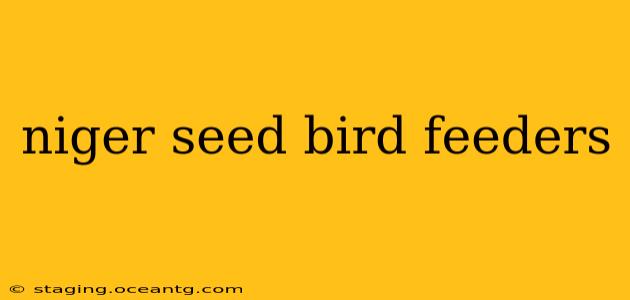Niger seed, also known as nyjer seed, is a tiny, black oil-rich seed incredibly popular with finches and other small birds. Its high-energy content makes it a favorite, leading many bird enthusiasts to specifically use niger seed feeders to attract these charming feathered friends to their gardens. But choosing the right feeder is crucial to prevent seed waste and ensure your birds get the most out of this nutritious treat. This comprehensive guide will cover everything you need to know about niger seed bird feeders.
What Makes Niger Seed Feeders Special?
Niger seed is exceptionally small, and this presents a unique challenge for feeder design. Unlike larger seeds, niger seed can be easily scattered by the wind or pilfered by larger birds if the feeder isn't designed correctly. Therefore, niger seed feeders are typically designed to specifically prevent spillage and protect the seed from unwanted guests.
What Types of Niger Seed Feeders Are Available?
There's a variety of niger seed feeders available to suit different needs and preferences:
Tube Feeders:
These are perhaps the most popular type. They feature a central tube with small feeding ports, often protected by a cage to keep out larger birds like squirrels and starlings. This design minimizes seed waste and keeps the seed dry.
Mesh Feeders:
These feeders utilize a fine mesh bag or container to hold the niger seed. The small holes allow finches to access the seed while deterring larger birds. They're often easy to clean and refill.
Hopper Feeders:
Some hopper feeders are designed with smaller ports specifically for niger seed, preventing larger birds and squirrels from accessing it. These can hold a larger quantity of seed compared to tube or mesh feeders.
How to Choose the Right Niger Seed Feeder
Choosing the best niger seed feeder depends on several factors:
- Bird species: Consider the species you want to attract. Finches are the primary target for niger seed, but other small birds might also visit.
- Capacity: Choose a feeder size appropriate for your needs and the number of birds you anticipate visiting.
- Ease of cleaning: Regular cleaning is essential to prevent the spread of disease. Look for feeders that are easy to disassemble and clean.
- Durability: A durable feeder will withstand the elements and last for years. Consider materials like metal or high-quality plastic.
- Squirrel resistance: If squirrels are a problem in your area, invest in a feeder with robust squirrel-resistant features.
How to Fill and Maintain a Niger Seed Feeder?
Keeping your feeder clean and full is critical for attracting and keeping birds happy and healthy.
- Filling: Simply fill the feeder according to the manufacturer's instructions.
- Cleaning: Regularly clean your feeder with warm, soapy water. Rinse thoroughly and allow it to dry completely before refilling. Avoid using harsh chemicals.
- Location: Place your feeder in a safe location away from predators and in an area with sufficient shelter from the elements.
What other seeds can I use with Niger seed?
While Niger seed is primarily for finches, you can sometimes blend it with other small seeds, such as white proso millet or sunflower chips (ensure they're small and not too large for the feeder's ports). However, avoid mixing it with large seeds which could block the ports and prevent finches from accessing the niger seed.
Are there any disadvantages to using niger seed feeders?
One potential disadvantage is that niger seed can be more expensive than other bird seeds. Additionally, if not properly cleaned, feeders can become breeding grounds for bacteria, so regular cleaning is essential.
What are the benefits of using a niger seed feeder?
The primary benefit is attracting a wide variety of finches and other small birds to your garden, offering excellent birdwatching opportunities. The high-energy content of niger seed provides birds with essential nutrients for survival, especially during harsh weather conditions.
By following these tips, you'll be well-equipped to choose and maintain the perfect niger seed feeder to attract a flock of beautiful finches to your backyard. Remember, providing a clean and reliable food source is key to attracting and keeping these delightful birds happy and healthy!
